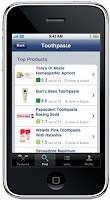 The good people at GoodGuide are providing a fantastic service to consumers. They are also changing CPG marketing.
The good people at GoodGuide are providing a fantastic service to consumers. They are also changing CPG marketing.GoodGuide has created "the world's largest and most reliable source of information on the health, environmental, and social impacts of the products in your home." What's in it? Who makes it? Where and how? What is the environmental impact of this product across its entire life cycle? These are some of the questions GoodGuide seeks to answer. They rate products to make it easy to quickly make better purchase decisions.
Over a million people have visited website (still in beta) and already there are over 70,000 products rated.
 Over 100,000 people have downloaded the free GoodGuide iPhone app making it easy to take this knowledge to the store shelf. A bar code reading capability is due out shortly.
Over 100,000 people have downloaded the free GoodGuide iPhone app making it easy to take this knowledge to the store shelf. A bar code reading capability is due out shortly.GoodGuide is candid about building a platform for "normal people" (not just bleeding edge, environmentally conscious, health freaks) to make healthier, socially and environmentally conscious decisions everyday.
It's somewhat ironic that people must seek out resources like GoodGuide to get the information they want on the products they buy. The extraordinary lengths GoodGuide has had to go to sleuth-out this information is equally ironic.
One of the founders, Dara O'Rourke in an interview today on Minnesota Public Radio shared anecdotes about how some companies were maneuvering to keep information pertaining to ingredients and environmental impact out of public view. Other more enlightened brands are actively working with GoodGuide to improve their scores.
Eventually brands will realize that transparency is a powerful differentiator and path to growth. First movers will likely reap disproportionate benefits. GoodGuide is dramatically accelerating this process. What's your product's GoodGuide score?







